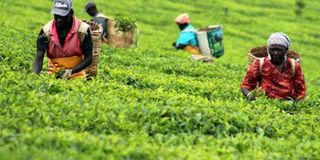Higher wages would hurt tea sector

Tea picking in Nandi County. A higher minimum wage would have hurt both small- and large-scale producers, leading to job cuts and harming the low-wage workers it was intended to help. FILE PHOTO | NATION MEDIA GROUP
What you need to know:
The multinationals account for slightly over 40 per cent of Kenya’s tea output.
They almost exclusively employ the growing cadre of world class-trained agro-scientists in the industry.
The minimum wage has been a battlefield in a larger political fight between trade unions and employers since independence.
The recent decision by the Court of Appeal to reduce the 30 per cent increase in basic wages awarded to tea pickers in 2014 to 16 per cent has helped to defuse a dispute that was threatening to bring down Kenya’s tea sector.
The Industrial and Labour Relations Court gave the pay raise to tea pickers allied to the Kenya Plantation and Agriculture Workers Union (KPAWU) for the 2014/2015 collective bargaining agreement (CBA).
Had it not been amended, the award would have led to an additional wage bill of 54 per cent of the turnover of tea multinationals. It would also have put immense pressure on smallholder farmers and co-operative producers, who can ill-afford similar wages to their farm workers, resulting in social disquiet in communities in the tea-producing areas.
To replicate the bonuses paid out to farmers over the past four years, so much needed to have been done in order to raise the chances of higher outputs, especially for exportation.
WAGE BILL
A higher wage bill would have adversely affected the incomes of both tea growers and processors, whose loss would not only have raised the wages but also eradicated their income.
The multinationals account for slightly over 40 per cent of Kenya’s tea output, almost exclusively employ the growing cadre of world class-trained agro-scientists in the industry and have heavily invested in research and development. The huge route-to-market infrastructure, port logistics, warehousing, brokers and tea tasters owe their existence to them.
In the Digital Age, when progressive agriculture is turning to robots to lower production costs and keep the industry competitive, dialogue in Kenya’s tea industry was still stuck on tea pickers’ wages.
Yet this was not a new debate.
MINIMUM WAGE
The minimum wage has been a battlefield in a larger political fight between trade unions and employers since Independence.
Labour standards, like environmental standards and investor protections, are essential to a functional economy. Properly set and enforced, they check exploitation, pollution and speculation, promoting prosperity as well as public confidence.
The tea industry is one of the most transparent with a large chunk of the labour costs visible through the unions on one hand and the revenues visible through the Mombasa auction on the other. This positive aspect has, however, turned the industry into a favourite hunting ground for the Kenya Revenue Authority and non-State actors.
Statistics show that the minimum work per tea picker per day in the plantations has been 33 kilogrammes of green leaf since the 1960s. But because of industry investments in high-yielding clones of tea bushes and improved crop husbandry, coupled with continuous training, one can pluck over 45kg per day.
Going by the normal rate of Sh13.65-Sh15.65 per kg, the minimum daily wage for tea plucking ranges from Sh450.45 to Sh516.45 while the monthly earnings are between Sh11,712 and Sh17,043. At worst, this is at par with — or even far outstrips — the minimum Sh12,926 stipulated for their contemporaries in high-cost towns and cities such as Nairobi and Mombasa.
JOB CUTS
Plantation enterprises incur other labour-related costs.
These include free housing, medical facilities and treatment, as well as sick-offs, electricity, water, education, gratuity, annual leave and travelling allowances for workers.
These add up to close to half the total wage bill and push the cost of plucking labour per person to a high of Sh23.48 per kilogramme of green leaf, or a minimum daily wage of Sh675.68.
A higher minimum wage would have hurt both small- and large-scale producers, leading to job cuts and harming the low-wage workers it was intended to help.
It would also have hurt tea exports by pushing up prices precipitously.
Tea plantations are the biggest manufacturing industry: They don’t just grow but also process tea. Agro-processing-manufacturing is also one of the big thrust areas of the government.
Kenya naturally has the ability to produce tea even without irrigation or the use of pesticides.
However, environmental issues such as degradation of Mau Forest have consequently fuelled climate change, affecting rainfall distribution. Related adverse effects such as shrinking lush season and longer dry spells raise the cost of production further.
Ignoring these crucial factors would have been counterproductive in the push for higher but unsustainable wages.
Mr Odongo comments on social issues. [email protected].




